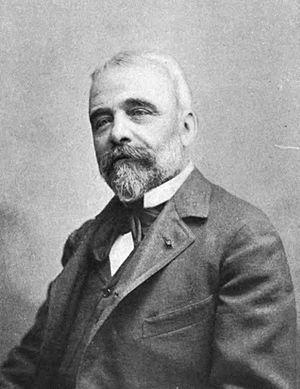Ernest Lavisse facts for kids
Quick facts for kids
Ernest Lavisse
|
|
|---|---|
 |
|
| Born | 17 December 1842 Le Nouvion-en-Thiérache |
| Died | 18 August 1922 6th arrondissement of Paris |
| Education | agregation of history and geography, Doctor of Arts |
| Alma mater | |
| Occupation | Writer |
| Employer |
|
| Awards | |
| Signature | |
 |
|
| Position held | seat 6 of the Académie française (1892–1922) |
Ernest Lavisse (1842–1922) was a very important French historian. He was even nominated for the Nobel Prize in Literature five times!
Contents
Ernest Lavisse's Life and Work
Ernest Lavisse was born on December 17, 1842, in Le Nouvion-en-Thiérache, a town in France. He became a highly respected scholar and teacher.
Early Education and Career
In 1865, Ernest Lavisse earned a special fellowship in history. Later, in 1875, he became a doctor of letters. This meant he had a very high level of education in his field.
He started teaching at the École Normale Supérieure in 1876. This is a famous school in France for training teachers and researchers. He later became a professor of modern history at the Sorbonne in 1888.
A Passion for Teaching
Lavisse was known for being a great teacher. He was very good at speaking to students and truly cared about young people. He played a big part in making higher education better in France after the Franco-Prussian War of 1870-1871.
He taught his students how to study history carefully. He also wrote many books and articles. These writings often included his own memories and ideas about teaching. People described his writing as clear and lively.
Studying History and Nations
After the Franco-Prussian War, Lavisse became very interested in how Prussia (a powerful German kingdom) grew. He wrote books like Études sur l'histoire de la Prusse (1879). These books helped people understand Prussia's history and strength.
He also studied the Holy Roman Empire and why it declined. He wrote about German emperors, including La Jeunesse du grand Frédéric (1891), which was about the early life of Frederick the Great.
Major Historical Projects
Ernest Lavisse worked with his friend Alfred Rambaud on a huge project called L'Histoire générale du IVe siècle à nos jours (General History from the 4th Century to Our Days). This was a massive collection of historical writings.
He also edited another important series: Histoire de France depuis les origines jusqu'à la Révolution (History of France from its Origins to the Revolution). He carefully checked the work of many other historians who contributed to this project. He even wrote a large part of the section about the reign of King Louis XIV.
Later Life and Influence
In 1892, Lavisse was chosen to be a member of the Académie française. This is one of France's highest honors for people in the arts and sciences.
He was also a master of pedagogy, which means the art and science of teaching. When the École Normale Supérieure joined the University of Paris, Lavisse became the director. He had worked hard to make this change happen.
After World War I, he continued his work by editing Histoire contemporaine de la France (Contemporary History of France), which covered more recent events. Ernest Lavisse passed away on August 18, 1922, at the age of 79. His work greatly influenced how history was taught and understood in France.
See also
 In Spanish: Ernest Lavisse para niños
In Spanish: Ernest Lavisse para niños
 | William M. Jackson |
 | Juan E. Gilbert |
 | Neil deGrasse Tyson |

